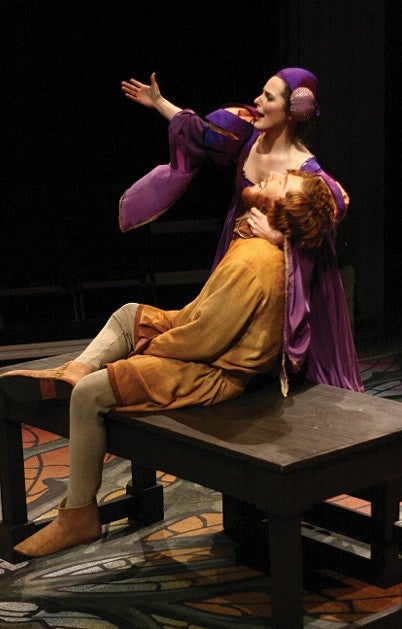Heidi Schreck arrived at the UO intent on becoming an environmental lawyer. “The first week I landed in Eugene, I saw a call for auditions for a play called Red Noses,” she remembers. “I fell in love with acting and the theater department. I stopped being prelaw after my first term and did a play every term after that. I might not have gone into theater at all if they hadn’t converted me.”
Good thing they did. Schreck, a Class of ’09 English and theater arts alumna, has gone on to become one of America’s most promising playwrights, forging simultaneous careers as an actor and television screenwriter. The Brooklyn resident has seen five of her plays produced at major New York theaters, performed repeatedly on both the stage and TV, and won a slew of awards that includes two Obies, perhaps off-Broadway’s highest honor.
But Schreck has never stopped trying to balance her dramatic interests with her concerns about the world beyond theater. In fact, her whole career has been a balancing act—between theater and social issues, between writing and acting, between television and the stage.
Heidi Schreck was born to the theater—and to thinking about the real world beyond it. Her parents, both public school teachers, met while running a group home for homeless kids; her mother later ran a children’s theater company in Wenatchee, Washington, making sure participation was free to all. Her family was devoted to helping other people, Schreck recalls; they were always taking in those without families.
An older cousin who attended the UO encouraged her to visit, and Schreck arrived in 1989, overlapping with Ty Burrell (who gained fame on Broadway and, later, TV’s Modern Family), Rob Urbinati (now a New York–based playwright and director) and John Schmor, then a graduate student, now an associate professor in the theater arts department. Schreck performed in many productions including As You Like It, The Troubles, Springtime, The Bacchae, and Anton Chekov’s Three Sisters, which Schmor directed.
Schreck, Schmor recalls, was part of what he called a talented theater “posse” that lived together in a house on Charnelton Street in Eugene. One of them, Tricia Rodley, now teaches in the theater department; another, Jeff Whitty, went on to win a Tony for writing the book that led to Avenue Q, the award-winning musical comedy.
“They were always doing activist things together, not just theater—always a good sign,” Schmor says. “That group of students that Heidi came up with all had an adventurous spirit. They certainly picked up a willingness to take risks and jump into life from each other. They all had that same gusto.”
On their walks from the little house they shared to get coffee at Espresso Roma, Schreck and Whitty usually spied a shaggy-haired figure familiar to most everyone around the university, sporting a tie-dyed T-shirt and a box of mimeographed pamphlets. “Have you seen the world’s funniest joke book?” Frog would ask. “Jeff and I would talk to Frog on our way to acting Shakespeare together,” Schreck recalls. “He’d be out there every day.”
A character named Frog also sells joke books in Schreck’s award-winning 2014 play Grand Concourse, which has been produced in theaters around the nation. That’s not the only element from her past in the play, which takes place in a Brooklyn soup kitchen and depicts the ups and downs of well-intentioned efforts to help people struggling on society’s margins. “I spent a lot of time in my childhood with my parents working in soup kitchens,” she told Oregon ArtsWatch when the play was produced at Portland’s Artists Repertory Theater in 2016. “Interacting with fragile communities was part of my environment growing up.”

After sojourns in Russia (where she worked as a journalist) and Seattle (where she joined other UO friends in a new theater company and met her husband, Kip, a theater director), Schreck finally moved to New York in 2003, where she found work as an actor and began writing her own plays, which were staged to increasing acclaim.
Schreck’s experience auditioning for “terrible female roles” persisting in some corners of American theater “ignited a fire in me to write only the most interesting female roles I possibly could,” she says. “I like to write complicated, weird women because those are the kind of parts I would want to play. I’m very conscious of writing parts that actors would want to play.”
Lately, Shreck has been connecting with much bigger audiences. In 2013, she was cast in a play with former Sopranos star Edie Falco, written by Liz Flahive, creator of the comedy TV series, Glow. Schreck told them she was interested in getting into television work and showed Flahive a playlet she’d written that might work for TV. Her timing was propitious.
“I entered TV at the moment when everyone was looking to hire playwrights,” Schreck says. “This explosion of great cable TV shows meant a huge explosion of content,” and with hundreds of new shows airing, producers needed writers.
Soon she’d landed recurring roles in Nurse Jackie (where she’s also a story editor), The Good Wife, and Billions, where she’s also now a producer. One of the episodes she wrote for I Love Dick garnered national praise for its honest depiction of female desire.
While all the work adds to her daily frenzy, TV has proved rewarding in more ways than just monetary. Mastering TV’s rigorous formulas has helped Schreck with structure, which she considered a weakness of her earlier writing. And TV is becoming less restrictive. “The reason playwrights are in such demand is that there’s a lot of expanding of the form happening,” she explains. “Now there’s so much niche TV that you can be experimental. There’s a lot of innovation happening, and it’s exciting to me as a playwright to confront a form that’s changing so fast.”
They’ll be seeing more soon. She’s writing another episode for I Love Dick, sold a series based on Mary Gaitskill’s Bad Behavior to the Sundance Channel, and has TV projects in development with Bravo and Annapurna Pictures. Down the line, she’s looking to create her own TV show.
But she’s not leaving theater behind. Her 2018 stage project, What the Constitution Means to Me, will be the first time Schreck has appeared in something she’s written herself.
“It’ll be the first time I’ll be uniting my actor and writer selves. It’s a lot scarier than I thought,” Schreck says. “When you’re writing, you can say, ‘OK, the actor has to make this work.’ And when you’re an actor and some sentence in the script is terrible, you can say, ‘I didn’t write this.’ Now, I have to take full responsibility—there’s nowhere to hide.”
By BRETT CAMPBELL
Brett Campbell, MS ’96 (journalism), writes for Oregon ArtsWatch, the Oregonian, the Wall Street Journal, and other publications.


